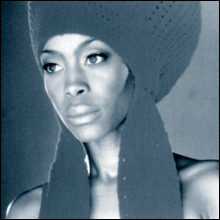![[Sidebar]](/standard/image/sidebar.gif)
![[Music Reviews]](/standard/image/headers/music_reviews_header.gif)
| clubs by night | club directory | bands in town | concerts | hot links | reviews & features |
Soul sisters
The many gifts of Erykah Badu and Sade
by Jon Caramanica
Erykah Badu
The gift of some singers has very little to do with songwriting, vocal tone, or ability to produce glottal histrionics at the drop of a mike. Just as great rappers use their voice as a percussive tool of its own, dipping in and out of the beat to add an extra dimension to the musical backdrop, great singers can achieve an almost eerie calm, leaving the listener feeling something close to woozy. Such deftness is one of the many gifts shared by Erykah Badu and Sade, two of this decade's more enigmatic and remarkable female vocalists.It's been years since either has graced the pop stage with an album proper -- almost four for Badu and a full eight for Sade, and plenty of rumors have been tossed about in regard to each's absence. During their time away, what's more, musical landscapes have shifted significantly. Badu has absorbed some of those transformations on her new second album, Mama's Gun (Motown) -- she comes across as both of the moment and somewhere in the nether space that exists above time and throughout it. Sade, for all her band's attempts to move forward, remains immune to change on her new Lovers Rock (Epic).
On Baduizm (Universal), her 1997 debut, Badu achieved a transcendent state. The album was like one long massage, varying in tone but not texture. All its emotions -- sass, anger, wit, love, heartbreak -- came together in a warm blanket of sound. Mama's Gun, from its feisty title on down, is a project of a different order. Instead of a saturated, unvarying aural effect, Badu aims for sonic eclecticism, both in her music and in her voice. On the opener, "Penitentiary Philosophy," the divine diva checks her restraint at the door for a Hendrix funk-supported wailfest -- she's preaching, and she's angry, and, yes, despite her cries, she still projects a refined façade. Producer James Poyser ties it all together neatly, and at track's end it's as if Badu had never even broken a sweat.
Poyser's magic is evident throughout. The behind-the-scenes linchpin of the Soulquarians (that loose collective of forward-thinking hip-hop and soul artists that includes Badu, Mos Def, the Roots, and Talib Kweli), he's given full range on Mama's Gun, and he engages in an unlikely combination of scenarios that takes advantage of Badu's natural thrum and also stretches it in unforeseen directions. "Booty" has outstanding hornwork, and it's slap-happy with a funk groove pregnant with strategic pauses. "Orange Moon" and "Green Eyes (Movement One)" are downright reserved with their jazzy vocals and minimal production -- they're the closest things here to Baduizm. "Kiss Me on My Neck," with its vocodered hooks, shows Poyser's (and Badu's) new experimental side.
It's hard not to relate some of what Badu sings about on Mama's Gun, and perhaps that experimental side, to her relationship with OutKast's Andre 3000, her former boyfriend and the father of her child. Every other song seems to hint at sadness, loneliness, and rejection, an odd position for a woman who's been the most royal figure R&B has seen in some time. On "Green Eyes" she confesses in hushed tones "Never thought I would, but I got dissed." Although she and Dre are reported to be still the best of friends (and Badu has moved on to a relationship with boho rapper Common), she obviously had some things to clear up, and it's the moments of emotional wrangling on Mama's Gun that lift Badu out of liquid-flow mode and into something less proven but equally compelling.
Would that Sade were so lucky as to have a support team like Poyser and the Soulquarians, or a heartbreaker like Andre 3000. Out of the spotlight for almost a decade, Sade is pop's Thomas Pynchon -- she's content to live with her family, tour rarely, and make music when she pleases. She's sold more than 40 million albums worldwide with her special brand of ambient soul, a sound that has always sounded distinctly global without ever coming across as foreign here in the US.
The music on her earlier albums lulled like soft ocean waves but never crashed over her serene salve of a voice. Her unflappable vocals are still present on Lovers Rock (time has weathered the voice slightly), but her band, the same from a decade ago, seem to be trying too hard to craft music as distinct as that voice. Drum kicks jab at her from beneath, and odd squalls of guitar feedback brush against her mellifluous tones. It may be "progress" of a sort, but Sade is one of those few artists whose sound has never needed amending. Unlike Badu, who's been made to do weird and wild things to mixed result, Sade is robbed of power by her collaborators' interference, and her potent, smoky alto is left more ephemeral than ever.
| home page | what's new | search | about the phoenix | feedback |
Copyright © 2000 The Phoenix Media/Communications Group. All rights reserved.
